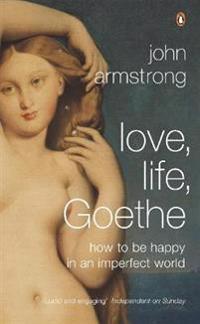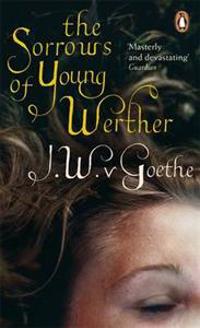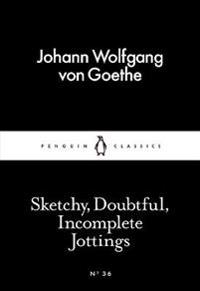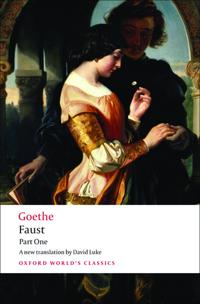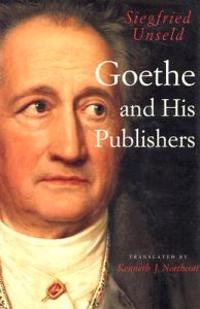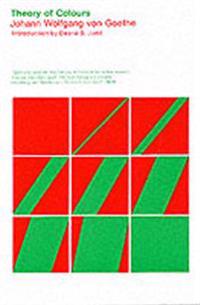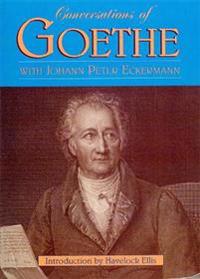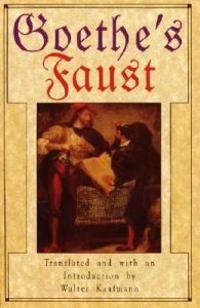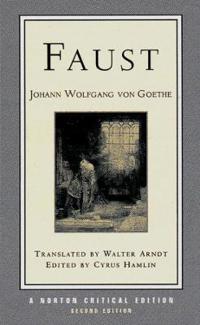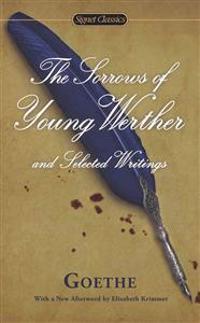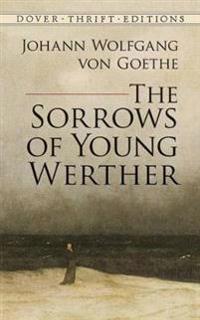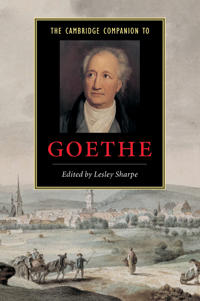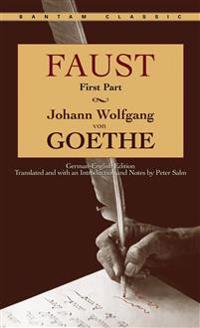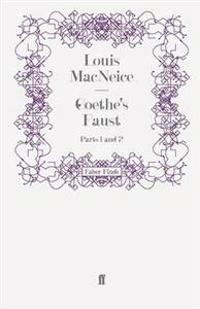Love, Life, Goethe (Storpocket)
avJohn Armstrong
ISBN: 9780141011288 - UTGIVEN: 200704Is it possible to be truly happy? In an imperfect world, how can we live well with what we have, and accept what we don't have? In "Love, Life, Goethe", John Armstrong looks at the life of the renowned yet often misunderstood writer Goethe to show the surprising ways in which we can learn from him, [...]
The Sorrows of Young Werther (Pocket)
avJohann Wolfgang von Goethe
ISBN: 9780141023441 - UTGIVEN: 200601You only find true love once. When Werther dances with the beautiful Lotte, it seems as though he is in paradise. It is a joy, however, that can only ever be short-lived. Engaged to another man, she tolerates Werther's adoration and encourages his friendship. She can never return his love. Broken-he[...]
Sketchy, Doubtful, Incomplete Jottings (Häftad)
avJohann Wolfgang von Goethe
ISBN: 9780141397139 - UTGIVEN: 2015-02'I can promise to be candid, not, however, to be impartial.' A selection of the most insightful maxims and reflections from one of Germany's greatest ever thinkers. Introducing Little Black Classics: 80 books for Penguin's 80th birthday. Little Black Classics celebrate the huge range and diversity o[...]
Classical Centre, The: Goethe and Weimar, 1775-1832 (Pocket)
avT. J. Reed
ISBN: 9780198158424 - UTGIVEN: 1986-05-29Faust (Häftad)
avJohann Wolfgang von Goethe
ISBN: 9780199536214 - UTGIVEN: 200805The legend of Faust grew up in the sixteenth century, a time of transition between medieval and modern culture in Germany. Johann Wolfgang von Goethe (1749-1832) adopted the story of the wandering conjuror who accepts Mephistopheles's offer of a pact, selling his soul for the devil's greater knowled[...]
Erotic Poems (Pocket)
avJohann Wolfgang Von Goethe
ISBN: 9780199549726 - UTGIVEN: 2008-10-01Editorial censorship has long obscured Goethe's Roman Elegies, which were inspired by Goethe's sexual liberation in Italy and his love for the woman he took as his unofficial wife on his return to Germany. They are here presented as Goethe boldly conceived them, together with the long-supressed narr[...]
Elective Affinities (Pocket)
avJohann Wolfgang Von Goethe
ISBN: 9780199555369 - UTGIVEN: 2008-12-15Mignon's Afterlives: Crossing Cultures from Goethe to the Twenty-first Century (Inbunden)
avTerence Cave
ISBN: 9780199604807 - UTGIVEN: 2011-09-22Goethe
ISBN: 9780199689255 - UTGIVEN: 2016-04In 1878 the Victorian critic Matthew Arnold wrote: 'Goethe is the greatest poet of modern times...because having a very considerable gift for poetry, he was at the same time, in the width, depth, and richness of his criticism of life, by far our greatest modern man.' In this Very Short Introduction[...]
Goethe and His Publishers
ISBN: 9780226841908 - UTGIVEN: 1996-11Poet and natural philosopher, critic and raconteur, Goethe was the most commanding literary presence of his time. This text organizes the many details of Goethe's career in print. Director of the German publishing company Suhrkamp Verlag, Siegfried Unseld brings a singular perspective to this biogra[...]
Reading After Freud: Essays on Goethe, Holderlin, Habermas, Nietzsche, Brecht, Celan and Freud (Övrig)
avRainer Nagele
ISBN: 9780231062862 - UTGIVEN: 1987-04-16Metamorphosis of Plants, The (Övrig)
avJohann Wolfgang Von Goethe
ISBN: 9780262013093 - UTGIVEN: 2009-09-08The Metamorphosis of Plants, published in 1790, was Goethe's first major attempt to describe what he called in a letter to a friend "the truth about the how of the organism." Inspired by the diversity of flora he found on a journey to Italy, Goethe sought a unity of form in diverse structures. He ca[...]
Theory of Colours (Häftad)
avJohann Wolfgang von Goethe
ISBN: 9780262570213 - UTGIVEN: 197001By the time Goethe's Theory of Colours appeared in 1810, the wavelength theory of light and color had been firmly established. To Goethe, the theory was the result of mistaking an incidental result for an elemental principle. Far from pretending to a knowledge of physics, he insisted that such knowl[...]
Conversations of Goethe (Häftad)
avJohann Peter Eckermann
ISBN: 9780306808814 - UTGIVEN: 199808German poet, dramatist, novelist, translator, scientist, and musician, Johann Wolfgang von Goethe (17491832) was the last universal genius of the West and a master of world literature, the author of The Sorrows of Young Werther, Wilhelm Meister, and Faust. Nowhere else can one encounter a more pene[...]
Selected Works (Inbunden)
avJohann Wolfgang von Goethe
ISBN: 9780375410444 - UTGIVEN: 200005Published in concert with the 250th anniversary of Goethe's birth, this selection of great works from the German writer includes The Sorrows of Young Werther and Faust, among others.[...]
Faust (Häftad)
avJohann Wolfgang von Goethe
ISBN: 9780385031141 - UTGIVEN: 199801The best translation of Faust available, this volume provides the original German text and its English counterpart on facing pages. Walter Kaufmann's translation conveys the poetic beauty and rhythm as well as the complex depth of Goethe's language. Includes Part One and selections from Part Two.[...]
Faust (Häftad)
avJohann Wolfgang von Goethe
ISBN: 9780393972825 - UTGIVEN: 200010This edition includes both part I and II of the drama. It represents a significant departure from its predecessor in terms of supporting apparatus and the "Interpretative Notes" have been expanded. "Contexts" includes five new selections by Goethe on the composition of the novel. "Criticism" include[...]
Analytical Psychology and German Classical Aesthetics: Goethe, Schiller and Jung (Storpocket)
avPaul Bishop
ISBN: 9780415430296 - UTGIVEN: 200807The second volume of Analytical Psychology and German Classical Aesthetics builds on the previous volume to show how German classicism, specifically the classical aesthetics associated with Goethe and Schiller known as Weimar classicism, was a major influence on psychoanalysis and analytical psychol[...]
The Sorrows of Young Werther and Selected Writings (Pocket)
avJohann Wolfgang von Goethe, Elisabeth Krimmer
ISBN: 9780451418555 - UTGIVEN: 2013-03"The Sorrows of Young Werther" brings to life an idyllic German village where a youth on vacation meets and falls for lovely Charlotte. The tragedy unfolds in the letters Werther writes to his friend about Charlotte's charms, even after he realizes his love will remain unrequited. "Reflections on We[...]
The Sorrows of Young Werther (Pocket)
avJohann Wolfgang Von Goethe, Thomas Carlyle, R. D. Boylan
ISBN: 9780486424552 - UTGIVEN: 200210One of the world's first best-sellers, this tragic masterpiece attained an instant and lasting success upon its 1774 publication. A sensitive exploration of the mind of a young artist, the tale addresses age-old questions--the meaning of love, of death, and the possibility of redemption--in the form[...]
Goethe (Pocket)
avRonald D. Gray
ISBN: 9780521094047 - UTGIVEN: 1967-06This is a concise survey and criticism of Goethe?s work, for the general reader and the student. It is intended as a useful first book from which the reader can proceed to more specialised studies. Here Goethe?s work is seen as a whole, and from the point of view of literary criticism. The first cha[...]
The Cambridge Companion to Goethe (Pocket)
avLesley Sharpe
ISBN: 9780521665605 - UTGIVEN: 200205The Cambridge Companion to Goethe provides a challenging yet accessible survey of this versatile figure, not only one of the worldâs greatest writers but also a theatre director and art critic, a natural scientist and state administrator. The volume places Goethe in the context of the Germany a[...]
Faust (Häftad)
avJohann Wolfgang von Goethe, Peter Salm
ISBN: 9780553213485 - UTGIVEN: 192001Goethe's masterpiece and perhaps the greatest work in German literature, Faust""has made the legendary German alchemist one of the central myths of the Western world. Here indeed is a monumental Faust, an audacious man boldly wagering with the devil, Mephistopheles, that no magic, sensuality, experi[...]
Goethe's Faust (häftad)
ISBN: 9780571243518 - UTGIVEN: 2008-05Offers a translation of "Goethe's Faust", and distills the digressive dimensions of the original - at once a play and an epic poem - into a verse drama for the ear.[...]

